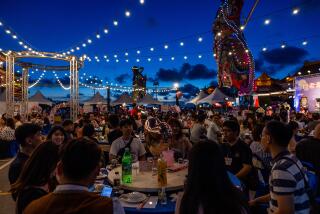Idle Youth Coddled by ‘5 Cs’
SINGAPORE--Fifteen-year-old Kalliste Oh doesn’t make her bed. She also doesn’t clean her room, or iron her private-school uniforms or straighten her 50 pairs of shoes.
That’s what her family’s three Filipino maids are for, she says.
Oh says she can’t perform basic domestic duties and has never held an after-school or summer job.
“Whatever I need, I ask for,” she says, whiling away a muggy afternoon inside one of Singapore’s air-conditioned havens for teen consumers. “It’s true, I can’t do anything.”
This attitude among Singapore’s first generation born into widespread wealth is causing public hand-wringing by parents and government officials.
Singapore’s young people are probably no more coddled than their counterparts in other wealthy countries. The difference is that in Singapore--a nation that has gone from Third World to First World in a single generation--spoiled youths have popped up on the radar screen of the country’s control-obsessed leaders, who demand a say in everything from dating to the courteous use of mobile phones.
Prime Minister Goh Chok Tong recently railed against children who “grew up with a silver spoon in their mouth, a maid at their beck and call, and a car to bring them around.” Singaporean youth, he said, must “rediscover some of the self-reliant spirit of earlier generations.”
Only three decades ago, Singapore’s national survival seemed unlikely after it broke away from an ill-fated two-year merger with neighboring Malaysia. The country was a slum-ridden, malaria-infested backwater with few natural resources, no armed forces and hostile neighbors.
Enter Lee Kuan Yew and his ardent followers in the People’s Action Party, which has dominated Singapore politics since independence in 1965.
Under Lee’s firm rule, Singapore--whose only true resource was its position astride one of the world’s busiest shipping routes--quickly evolved into a regional transportation, business and financial hub.
Per capita gross domestic product for the country’s 4 million inhabitants has increased about forty-fold since independence, reaching $20,732 in 2001, according to government figures. That figure ranks it among the highest in the world.
Homelessness and hunger have been replaced by Hermes and Harrods.
Nowadays, one in every seven families has a foreign maid, the Ministry of Manpower says. Some, like Oh’s family of eight, have several maids to watch the children and fend off the rot and mold endemic in this tropical climate.
The government-linked Straits Times newspaper printed an article titled “The Instant-Noodle Generation,” featuring a survey of 104 teens. When asked how dependent they were on maids, most rated themselves about a 7 out of 10--with 10 being completely dependent.
Now, a new government task force called Remaking Singapore has begun studying how to spur Singaporeans beyond the “five Cs” of Singapore life: cars, clubs, careers, condos and credit cards.
This consumerism is on display along Singapore’s famous Orchard Road, which rivals Paris’ Place Vendome, Tokyo’s Ginza or New York’s Madison Avenue for luxury products.
Also lining Orchard Road are plazas devoted entirely to teenagers. They’re crammed with food courts, video arcades, even spas.
In the five-story mall where Oh and her friends are waiting to see the Hollywood movie “Bandits,” the girls chat on mobile phones and ride the escalators between floors designed as movie sets. They cruise arcades with fancy wireless interactive games played on high-tech gadgets. Kids in the latest fashions linger in front of the complex, some blowing smoke rings.
Many say these youngsters are a byproduct of Singapore’s driven society. Although they may lead easy lives, that doesn’t mean they’re not also industrious, particularly in their studies, says 25-year-old Chong Tze Chien, creator of “Spoilt,” a play about a Prada-shod Singaporean woman tormented by an existential void.
“Sure, kids are spoiled. But the word has a double meaning. Kids work very hard in school--but then they’re rewarded. And they end up pampered,” he says.
Some say spoiled children are partially a product of Singapore’s paternalistic state apparatus.
But that’s not the whole story, Chong says.
“We’re taught to have more, that more is good,” he says. “We know it’s wrong, but we can’t pull ourselves away from it. It’s like a drug.”
More to Read
Sign up for Essential California
The most important California stories and recommendations in your inbox every morning.
You may occasionally receive promotional content from the Los Angeles Times.










